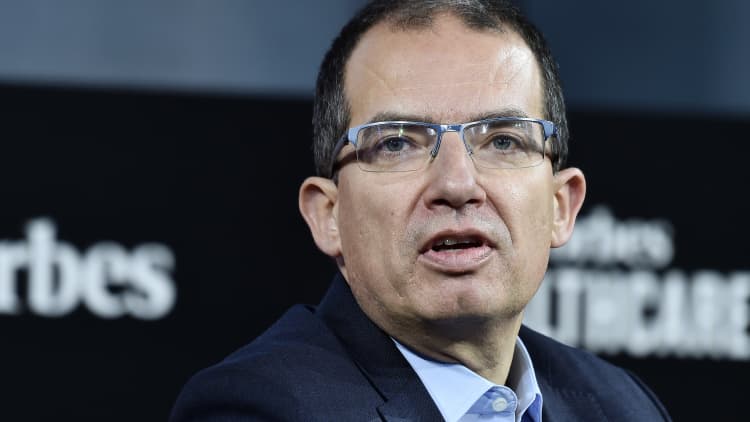White House coronavirus advisor Dr. Anthony Fauci said Monday he is "not particularly concerned" about the safety risk of a potential coronavirus vaccine by Moderna, despite the fact that it uses new technology to fight the virus.
The vaccine, which entered a large phase-three human trial Monday, uses messenger ribonucleic acid, or mRNA molecules, to provoke an immune response to fight the virus. Scientists hope mRNA, which relays genetic instructions from DNA, can be used to train the immune system to recognize and destroy the virus. While early studies show promise, mRNA technology has never been used to make a successful vaccine before.
"It's a novel technology. We are certainly aware of the fact that there's not as much experience with this type of platform as there are with other standards," Fauci, director of the National Institute of Allergy and Infectious Diseases, told reporters on a conference call alongside National Institutes of Health Director Dr. Francis Collins.
"I'm not particularly concerned," Fauci said. "But I don't want a lack of severe concern to get in the way that we are keeping an open mind to look for any possible deleterious effects as we get into and through the phase-three trial."

Scientists could know whether a potential coronavirus vaccine by Moderna works as early as October but will likely have the full results by November, Fauci said.
Moderna, which is working in collaboration with the NIH, announced earlier in the day that it began its late-stage trial for its vaccine. The trial will enroll at least 30,000 participants across at least 87 locations, according to ClinicalTrials.gov. Participants in the experimental arm will receive a 100 microgram dose of the potential vaccine on the first day and another 29 days later. Some patients will receive a placebo.
If approved by the Food and Drug Administration, Moderna's experimental vaccine would be the first of its kind. Researchers will follow participants after the phase-three trial for one year to monitor the vaccine's potential safety risks and two years to monitor its efficacy, Fauci said.
Fauci said he hopes the vaccine will have an efficacy of at least 60%, meaning on average the vaccine reduces a person's risk of a Covid-19 infection by 60%. "Obviously, we would like to see it much, much higher. But 60% is the standard that you do for the cutoff. That's not unusual," he said. "I would like to see the highest percentage that we could possibly get."
Fauci touted the potential vaccine as a huge achievement, saying the time it took from getting the virus' genetic sequence to a phase-three trial was a record for the United States.
The comments by Fauci came days after he said a coronavirus vaccine likely won't be "widely available" to the American public until "several months" into 2021.
Public health officials and scientists expect to know whether at least one of the numerous potential Covid-19 vaccines in development is safe and effective by the end of December or early next year, he said during a live Q&A with The Washington Post on Friday.
"It is likely that at the beginning of next year we would have tens of millions of doses available," Fauci said, adding that some drugmakers have predicted more doses than that. "I think as we get into 2021, several months in, that you would have vaccines that would be widely available."
Though scientists expect to have an effective vaccine widely available by next year, there is never a guarantee. While drugmakers are racing to make millions of doses of vaccines, there's a chance the vaccine will require two doses rather than one, potentially further limiting the number of people who can get vaccinated once a vaccine becomes available, experts say.
Moderna said it remains on track to deliver between 500 million and 1 billion doses per year starting next year.


